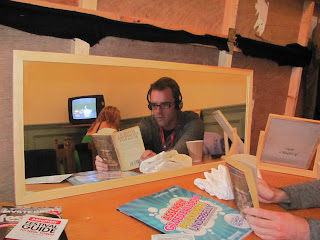After a lengthy (okay, two minute) discussion, Brendan and I decided that our second reading challenge (required by
the official rules) would be a book that neither of us had read.
Brady Udall's "
The Lonely Polygamist" has appeared on
many different (1)
must read (2)
lists (3) this year and, despite it being 600 pages, we both were up for the challenge.
First, the disclaimer: Brendan, this post may contain spoilers. You still need to read the book.
Brendan and I grew up one generation removed from a big family: our father is the second oldest of nine children. Because our father has never once said anything negative about his family (seriously, nada), we always believed that being part of a large family was, hands down, the best thing ever. (But it's just me and Brendan in our family; perhaps it's better to be the child in a large family than the parent?). Holidays with our dad's immediate family always meant a party of at least 50. Living within a 15 mile radius of most relatives, we spent every Sunday morning with our grandparents, aunts, uncles and cousins. We all got along, visits never felt like a chore, it was all quite idyllic. Big families rock. (And yet I happily stopped at three).
Even without our family history, I'd probably still be intrigued by large families, what with my love for
TLC and
Discovery Channel. My time with
Jon+Kate and the
Duggar family goes all the way back to their first one-hour specials. I'm fascinated by how they handle the logistics of all those kids (bickering and fundamentalism aside). My favorite family by far is the
Hayes family, who are mostly overlooked by the media since they're actually normal (other than having two sets of twins and sextuplets). I'll admit to watching all of these shows when I was pregnant with my twins, taking note of what to do and what to avoid.
Polygamy, however...polygamist families just don't hold any interest for me. Sure, their families are super big, but I can't see past the usual subordination of women, lack of education, ultra conservativeness, child brides, forced marriages and insular world that they call their community. These families are not entertainment (I've never watched
Big Love), they're
news headlines.
But Brady Udall's
interviews on this book got me hooked. He said his focus was on contemporary polygamy. He highlighted families that functioned with respect for women and education (including one family that boasted a PhD and attorney as two of the wives). He said there are plyg families who live their lives more integrated with the typical world. In fact, he even confessed to being the product of polygamy (a great grandparent was the child of a man and second wife). Udall never claims that polygamy is right or recommended, but suggests that today's polygamists are less fundamentalist extremists and more like the average American family than we may think. Udall's interviews even got me thinking about the acceptance of "legal polygamy", that it's generally okay for a man to have a family with one wife, divorce her, remarry and reproduce, divorce, repeat.
Hugh Hefner is practically exalted by the media, and he's got a harem. Udall got me thinking that it's time for me to walk my liberal talk and take a closer look at this notion of contemporary polygamy.
I don't know what book Udall was referencing in these interviews, but "The Lonely Polygamist" is not contemporary at all, unless you take into account the family's running water, electricity and public school education (for some). Golden, the patriarch, is an uneducated, self-involved, barely-scraping-by general contractor with a disfiguring overbite. Beverly is the Bible thumping first wife who arranges the subsequent marriages to his other wives: Nola (laughing nitwit); Rose-of-Sharon (mentally unstable); and Trish (formerly abused). There is little family cohesion, but plenty of bickering, borderline abusive teasing, bullying, and neglect. Several children die as a result of lack of supervision and intervention. Throw in infidelity, prostitution, and poverty, and that's the book. Newsflash to Udall: this is exactly what I thought polygamy was like.
Don't get me wrong: "The Lonely Polygamist" is extremely well-written with quite a few characters that grab the reader from the start. Several characters grapple with wrenching decisions and certain moments bring out inner heroes. I understand why the book is so popular on the must-read lists. But contemporary it is not. Take away the utilities, medical progress, hard core construction equipment, and public schools, and you've got yourself a basic polygamy story that could be from any post
Joseph Smith, Jr era.
Hmm...so maybe that's Udall's point after all?
 My dog, Josie, amidst the books I had the best of intentions of reading this summer. It should be noted that the taking of the photograph instigated a large drop of drool to fall on Brady Udall's opus. I think it will be fine.
My dog, Josie, amidst the books I had the best of intentions of reading this summer. It should be noted that the taking of the photograph instigated a large drop of drool to fall on Brady Udall's opus. I think it will be fine.







 This is the high school English Literature award I received in my senior year. Instead of trophies, our school awarded books related to the field of study, selected by the teachers with the recipient in mind. My book, chosen with care by the Head of the English Department was...
This is the high school English Literature award I received in my senior year. Instead of trophies, our school awarded books related to the field of study, selected by the teachers with the recipient in mind. My book, chosen with care by the Head of the English Department was...





